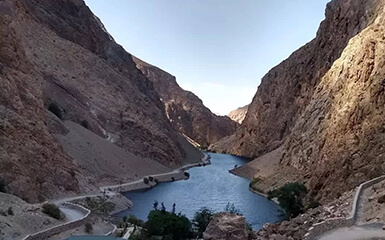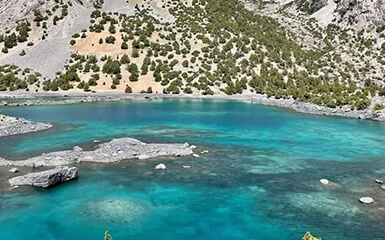Kok Gumbaz
Ajina Teppa
Ancient Panjakent
Anzob Tunnel
Beshkent Qala
Childukhtaron
Khazrati Shokh
Mug Teppa
Gharm Chashma
Hisor Historical
Haji Yaqub mosque
Hazrati-Bobo complex
Lake Iskanderkul
Kalai-Khumb
Karatag
Karon
Khishtin caravanserai
Khorog
Khulbuk
Lake Karakul
Abdullatif Sultan
Madrasai Kuhna
Abu Abdullah Rudaki
Khoja Mashhad
Khudoyor Valami
Makhmudi Azam
Mir Sayyid Ali Hamadani
Muhammed Bashoro
Sheikh Muslihiddin
Nurek Mountain Lake
Pamir
Sarazm
Sari-Khosor
Seven Lakes
Shirkent
Chiluchorchashma
Takht-i Sangin
Lake Iskanderkul

Iskanderkul is a moraine lake in the mountains of Tajikistan. Iskanderkul is located on the northern slope of the Hissar Mountains in the south of the Sughd province. The 3.4 km² large lake is at an altitude of 2195 m. Its maximum depth is 72 m. The Iskander darya, the left headwaters of the Fan darya, drains the Iskanderkul on its north-eastern bank. Thus, the lake is located in the catchment area of the Zeravshan.
An access road runs along the Iskander darya, which branches off from the trunk road between Dushanbe and Tashkent. The lake is developed for tourism.
The name of the lake goes back to Alexander the Great, whose horse, according to legend, drowned in the lake. Accordingly, the word Iskanderkul results from the Persian pronunciation of the name Alexander, Iskander and the Tajik word for lake, kul. There are two legends about the lake. The first relates that Alexander the Great subjugated a tribe that did not want to surrender by changing the direction of the river, leaving the tribe's village under water, and the lake was formed because of this change. The second legend tells that Alexander's horse Bucephalus caught a cold while drinking the icy water of the lake or drowned in the lake's waters. Since then, legend has it that Bucephalus came to graze in this area every month at the full moon, letting the lake's waters pass, and appearing at the summit as white as snow.
On the shores of the lake, there is a small holiday complex that dates back to Soviet times and is frequented by the population of the capital Dushanbe and the surrounding area of the lake in the summer months. The Tajik President's holiday home is located on the opposite bank of the lake. This building cannot be reached via the road leading to the lake, but only via a specially constructed helicopter-landing pad or by boat.
For this purpose, the large dining room of the holiday complex was extended towards the lakeshore and a landing stage was added. Driving on the lake without a special permit is prohibited for reasons of species protection. There is a bird sanctuary on the lakeshore.

